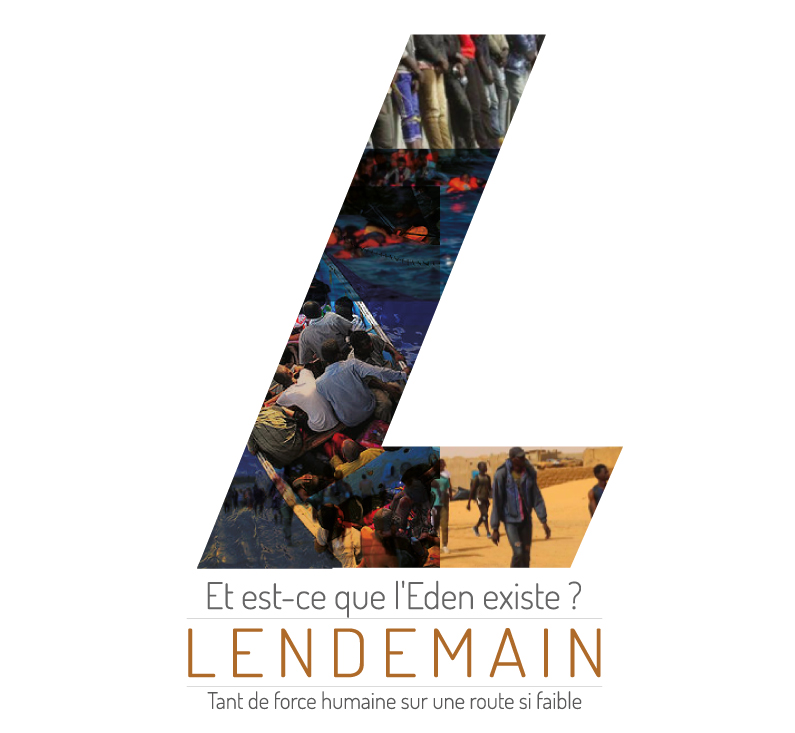LENDEMAIN. “So much human strength on such a weak road” Documentary project on migration routes from Africa to Europe.
Project supported by the Institute of Migration of the University of Granada (Spain), the Institute of African Observation of the University of Valladolid (Spain), the Yuruani Foundation (Switzerland), the Association Jardiniers Culturels (France).
Social action audiovisual project
The point of view of the protagonists of migration themselves - the Africans who decide to embark on a migratory journey to Europe - will enable us to present an “other” story that challenges the simplifying and homogenous narrative of hegemonic discourses in Europe.
Disseminate an alternative account of sub-Saharan migration to Europe through the eyes of the migrants themselves. The aim is to show a reality of migration that goes unnoticed in the face of the “sacralization” of migration in Africa and profound ignorance in Europe. Showing each migrant's story, as a collection of diverse narratives, will help to make more complex a reality that is characterized by the fact that it reflects unequal relations between countries and societies.
Key information
Field: Social sciences, cinema, photography
Type of project: Social action, Research, National and international
Beneficiaries: The Senegalese migrant population.
Public:
Open to all
Key project dates:
Shooting starts: 20 Nov 2022
In collaboration with:
Institut des migrations de l'Université de Grenade (Spain), Institut d'observation de l'Afrique de l'Université de Valladolid (Spain), Fondation Yuruani (Switzerland), Association Jardiniers Culturels (France).

F. JAVIER GARCÍA CASTAÑO
Professor of Social Anthropology in the Department of Social Anthropology and Director of the Migration Institute at the University of Granada.
(Bilbao, 1960) Doctor of Philosophy and Arts from the Complutense University of Madrid and Professor of Social Anthropology at the University of Granada, he has devoted himself exclusively to the anthropological analysis of cultural processes in various educational contexts. He has coordinated several research projects on the schooling of children of foreign nationality funded by various national (National R&D&I Plans) and international institutions.
José Manuel Maroto Blanco
Margarita Salas postdoctoral fellow at the University of Paris VIII and the University of Granada since January 2022. His research focuses on Spanish official development assistance (ODA) to sub-Saharan Africa, the analysis of media-generated racist discourse in Spain, and the coping strategies of the Black African population in the face of racism. He is coordinator of the books Historia de unas letras Nzassa. Trayectoria de la literatura marfileña en lengua española (Serbal, 2022), Migraciones y población africana en España. Historias, relatos y prácticas de resistencia (EUG, 2020) and Migraciones y comunicación intercultural: una mirada interdisciplinar (Cuadernos Artesanos, 2019). He is currently developing a research project on the life of a Senegalese migrant in the 1970s. He is also studying the memory of migration and the anti-Franco struggle in the Granada towns of Salar and Zafarraya. He has published on Granada, where he currently lives, and its threatened expulsion, as well as the violence he endured in the 90s. Finally, he looks at the process of family reunification, his work in the countryside and the co-development initiatives he leads in Kouki and Louga, Senegal.
Mercedes Carolina Duran T.
Designer, photographer and anthropologist. She is currently a PhD student in Anthropology (IMAF/EHESS), co-tutored with the PhD in Migration Studies (University of Granada). Her anthropological research focuses on the relationship to identity through self-representation and group relations, through clothing and aesthetic elements, and on migration processes between Africa and Europe. She is also president of a student association in Paris for equality and sustainable development. She coordinated the 43 etnias photo documentary project, which documented the experiences of 80% of Venezuela's 43 ethnic groups.
